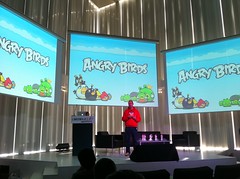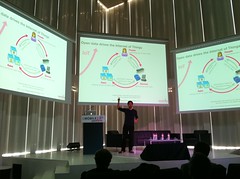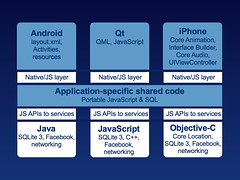Links for June
June 28, 2011 | Comments- Transitions: The Nokia Way vs. The Microsoft Way: "Microsoft knows better than to osborne itself. The company has consistently stuck to its “Windows Everywhere” mantra and, no less consistently, has made sure that every new version of Windows offers strong backwards compatibility... For Microsoft, there is no Post-PC market". The more I see of the Microsoft/Nokia tie-up, the more interesting I think it could be. Go look at the VisionMobile report and look at the figures for device shipments and numbers of apps. iOS has the highest number of apps/device, WP7 is second, Android third. If Nokia can deliver volume shipments - and it's the thing they've been consistently good at - this'll be interesting.
- What To Do When A Tech Giant Decides To Eat Your Lunch: "Platforms are channels not businesses. Don’t confuse the two. If you put all of your eggs into one platform shame on you, not them. If their business torpedoes you, you should have been diversified". I've not understood the beef some people have with companies that provide platforms at no cost. If it's commercially funded you're not paying for it, what right do you have to demand service - as a developer, or a user?
- Thinking Outside The Browser Box: Why Should Apple Play By Current Internet Rules?: "Apple is not anti-Internet, they just believe that they can serve it to users better as a backend to their native apps rather than through a frontend in the Web browser". A few conversations have me personally more fired up about the Internet than the web. The web's starting to feel old, creaky to me. The forgiving parsers of human-readable markup and the duct-tape languages we used to bind and style them have accumulated cruft. It feels biological, a beautiful breathing wonder with vestigial organs, ripe for a fall from the top of the food chain.
- How to Build Location-Based Apps That Don't Suck: "High latency and a lack of offline support in location-based mobile apps is a blight that must be cleansed". That offline use case keeps hanging around, and rightly so. The sooner we stop users from worrying about signal strength, the better.
- Why mobile apps suck when you're mobile: "(another) reason to build a great offline / flaky mode for your app so that users aren't quite so frustrated by those spinners". Plus great reasons to understand more of the stack than an HTTP library: businesses that take responsibility the end-to-end experience produce products that are all the better for it.
- Pew: Adoption Of E-Readers Doubles In 6 Months, Bigger Than Tablets: "The ownership of e-readers doubled from six months prior when it was 6 percent... Only 8 percent of respondents said they [own] a tablet, compared to 5 percent six months earlier. "
Why the Web Won't Do
June 27, 2011 | CommentsI thoroughly enjoyed Mobile 2.0; you can see the slides from "Why the Web Won't Do", the talk I did on the second day, here. To summarise what I said:
- We treat web sites and apps differently and adopt different mental models when discussing them (geographic and toolish, respectively);
- It's not like fragmentation is going away; in the last 2 years we've seen Nokia/Qt, Windows Phone 7, WebOS, Bada, etc. all emerge.
- The web is great for serving media across devices, but...
- End-users expect apps to make efficient use of battery life and network. Apps should cope with lack of connectivity and their UI should be consistent with the rest of the device (in appearance, behaviour and responsiveness). The web falls short here.
- If you try to build a native app with HTML5 and friends, you're using a stack of web technologies (OS, browser, JavaScript library, your app) to emulate the thing at the bottom of that stack. Performance will suffer; you're at the mercy of this intermediate layer. It won't feel "right". You'll likely end up fixing or working around platform-specific oddities anyway.
- So to satisfy users, make best use of the medium, and for technical reasons, you need to do something else to reduce the effort of delivering apps across platforms.
The approach we've come up with looks like this:
We bridge from each platform into an embedded JavaScript interpreter; write application-specific shared code in JavaScript, and share this code between platforms; and write the user interface natively. This gives us code reuse between radically different platforms (Android/Java, iOS/Objective-C, Qt/JavaScript) and a UI which is responsive, and can take advantage of every feature that Apple, Google or Nokia offer.
Once you've written the bridging code, the application code to do this is quite straightforward; and this is the approach we used on the Nokia and Android versions of the Glastonbury app.
There's a recurrent debate in the mobile industry right now, "native apps vs web". You can see plenty of wishful thinking in this debate ("the web will save us!"), and it's unhelpfully black-and white. There are other ways to combine the best of native and web, beyond sticking a web-view into PhoneGap. And there's nothing to stop you using a web-view as a presentation layer onto the structure described here, of course...
For Glastonbury we did the Qt version first, then Android. Android took about half the time of Qt and about half the time of a full-native iOS port, using the approach detailed here. The shared code had plenty of scrutiny (as it was examined during testing of both Android and Qt builds), and we could focus development effort on the UI in both cases - which we think paid off.
Songkick for 2
June 18, 2011 | CommentsI started playing with the Songkick APIs a couple of weeks ago. Songkick is a lovely service I've been using for a couple of years, that tells you when your favourite artists are touring nearby. In much the same way as Nike+ and Kindle, it's made a big difference to my life by stimulating a specific behaviour: getting out to see live music.
The API lets you query their mahoosive database of gigs and artists fairly simply - I've open-sourced a Java library which I've written to access their REST API, and wanted to use it on a Real Project to prove to myself that it actually worked for something useful.
I've rarely gone to gigs by myself. It's always been a social experience for me, and nowadays in my late 30s I quite enjoy catching up with an old friend by heading out to see someone from Our Youth play live. A couple of long journeys and a lazy Saturday in Barcelona gave me a chance to finish SongkickFor2, a little web app which helps you find a gig to go to with a friend. It's pretty simple: tap in your and your friends' Songkick usernames, and get back a list of upcoming concerts you both might like. I link through to the Songkick pages for these concerts, where you can buy tickets.
The sole reason this app doesn't look dreadful is the markup, CSS and aesthetic mastery of Dom, whose flat I'm staying at and who I worked with in the early years of Good Technology.
A Tale Of Two App Stores, revisited
June 18, 2011 | CommentsA follow-up on my tale of two operator app stores from a couple of weeks back:
Operator A has clarified (in an email to many developers) that when they said apps had been "published" they actually meant that the apps had been approved for sale, and were waiting for an individual country manager to select and launch them.
My take on this is that Operator A has managed to combine the worst of the old "operator portals" and the new app stores: an approval process for apps which is opaque, followed by an manual curation process with little external visibility. I would expect this to deliver the same level success that operator portals have delivered over the last 10 years.
Operator B, in the meantime, have contacted me directly by a couple of routes (one direct, one indirect) and, in between facepalming themselves, advised me to upload the app by an alternative site. I'll be doing this in time and will write up what I learn here.
Mobile 2.0 Europe, Day 1
June 16, 2011 | CommentsCunningly scheduled the two days before Sonar, Mobile 2.0 has snuck into my calendar for the last few years; and with Rudy knowing everyone in Europe, it's a good opportunity to meet a set of people I don't bump into around London (LIFT is similar, but perhaps more biased towards academia and away from the Mediterranean).
A combination of a late arrival in Spain the night before, an hour or so preparing slides for my talk tomorrow, complicated travel arrangements and pure laziness meant that I missed the very first session. I arrived at the impressive venue (Telefonica R&D HQ, I'm told) to find Peter Vesterbacka of Rovio, proudly displaying a bright plumage of Angry Birds merchandise and talking about their meteoric rise to fame.
 Peter's an old face on the European mobile scene and there's a sense that - much as with Russell Buckley - he's someone who's put the time in and is now reaping his just rewards. He's quite disarming, pointing to the 51 games they released before Angry Birds (which now coasts at 1m downloads a day), and presents Roxio as not a unique success, but rather part of a broader trend: mobile is a good place to build entertainment brands thanks to its wide reach and ability to engage daily. Compare production costs for mobile games with anything that might be produced in Hollywood; look at how Roxio roll out seasonal variants and regular game updates.
Peter's an old face on the European mobile scene and there's a sense that - much as with Russell Buckley - he's someone who's put the time in and is now reaping his just rewards. He's quite disarming, pointing to the 51 games they released before Angry Birds (which now coasts at 1m downloads a day), and presents Roxio as not a unique success, but rather part of a broader trend: mobile is a good place to build entertainment brands thanks to its wide reach and ability to engage daily. Compare production costs for mobile games with anything that might be produced in Hollywood; look at how Roxio roll out seasonal variants and regular game updates.
"We're not a mobile games company, we're a next generation entertainment franchise", he squawks. Rovio were a service business of 12 people (a similar size to FP), who successfully made the move into products. My feathers ruffled by jealousy, I nonetheless enjoyed hearing Peter talk so disarmingly about his business.
A panel discussion followed. Much of it covered well-trod ground (gamification, augmented reality and the importance of context) but the panel covered it well. They were united on the importance of context awareness, Which seems to me to be somewhat similar to targeting of advertising: mining a large amount of raw data, mining it and drawing conclusions from it. Given the internet and mobile advertising industry's failure to deliver on the promise of well targeted advertising over the last 15 years despite the vast amount of data ISPs and operators own concerning their customers, I found it hard to share their optimism about our ability to reliably derive context from sensor data? What will happen here that hasn't happened with advertising? I suspect that deriving anything reliably useful about context from a mass of sensor data is a Really Hard Problem... Though thinking back to Ted Morgan talking about work Skyhook had done in this area in a talk here 2 years ago, there seem to be some opportunities lurking in the short term.
 Usman Haque was up next to talk about Pachube, an amazing service I keep hearing about, getting enthused for, and failing to do anything with. They're am aggregator of sensor data, and Usman presented a stirring and deliberately contradictory Bill Of Rights for the Internet of Things. Definitely worth more attention.
Usman Haque was up next to talk about Pachube, an amazing service I keep hearing about, getting enthused for, and failing to do anything with. They're am aggregator of sensor data, and Usman presented a stirring and deliberately contradictory Bill Of Rights for the Internet of Things. Definitely worth more attention.
Di-Ann Eisnor of Waze followed up with a talk about the participatory city - essentially some use cases for the kind of data that Pachube is gathering, focused around some nice demos of her product. Waze looks to be a journey optimiser, using realtime traffic data to better inform drivers of routes to take.
Another panel: the panelists dwelt a little too long on the role of government in regulating or otherwise facilitating open data for my liking. Not that it isn't an important topic, but I'm more of a nuts and bolts kinda guy. Having spent a few evenings recently watching Adam Curtis' documentaries, I was driven to wonder how helpful it is to employ the metaphor of city as computer. What do we run the risk of losing by viewing our social structures - which aren't digital - through this lens, and how can we avoid losing it? It feels to me that nowadays if we measure something (school grades, say, or NHS waiting times) we are driven to optimise for the thing being measured, at the expense of that which can't be measured (a well-rounded education, say). I wonder if this is a valid concern, or just the first signs of my turning into an old man bemoaning contemporary society?
Coffee, and I'll confess I didn't follow the next couple of talks too closely. Andy Goodman of Fjord Madrid gave a thousand-foot-view of the Fjord view of the world; WorldReader seemed a worthy effort to put e-reading kit into the hands of pupils in the developing world.
AppCircus closed the day, and once again I was struck by how many really nice-looking apps (such as Nomad Analytics, who did a good presentation of what looks like an excellent Blackberry front-end onto Google Analytics) didn't have much of a solid business behind them. Sign of an app bubble, a congenital weakness in European startups, or me missing the point of what AppCircus is? I'm not sure. For me, iscandit stood out as a business with IP, a good-looking product, and some thought as to revenue and likely partnerships.
